Fast Facts
- When: 8th August 2023 to 22nd May 2024
- Where: Various, Final at the Aviva Stadium, Dublin, Republic of Ireland
- Watch: TNT Sport
- Official Website: UEFA Europa League
The Europa League is UEFA’s second most prestigious club competition behind only the Champions League. The latter is the premier competition and one of the biggest prizes in the game but the Europa League is still a major piece of silverware with teams such as Liverpool, Bayern Munich, Real Madrid and Juventus all multiple winners since the tournament was devised in 1971.
Qualification is open to each UEFA member nation and is generally contested by clubs finishing outside the Champions League qualifiers in the league the previous season but may also be open to the winners of domestic cup competitions amongst other possible routes.
The 2023/24 season sees the 53rd running of the Europa League as it is now known, below will be the best betting offers when available.
Existing Customer Free Bets & Money Back Offers
Get your single bets paid out if the team you back goes 2 goals ahead - for multiple bets the selection will be marked as a winner with bet365. Applies to pre-match single and multiple bets on the standard Full Time Result market for applicable competitions. Only available to new and eligible customers.
On a Europa League bet, both new and existing customers can get a minimum of one odds boosts per day which could be used to increase the odds you receive. These can be applied by selecting 'Boost' on your betting slip when available. Maximum stake £50.
On selected Europa League and Europa Conference League matches, Betfred will offer double the odds on the first goalscorer if they score two goals in that game, and treble odds if they score three or more goals. This can apply to pre-match bets, in-play bets, or both, please check the Betfred website for a full list if qualifying matches. Note that in-play bets will be settled on the next goalscorer and any subsequent goals.
Europa League Fixtures: Semi-Finals - Leg 1
Thursday 2nd May
- 20:00 Marseille v Atalanta
- 20:00 Roma v Bayer Leverkusen
Event Stats
Last 10 Europa League Finals – 2014 to 2023
| Date | Location | Winner | Score | Runner-Up |
|---|---|---|---|---|
| 31st May 2023 | Budapest | Sevilla | 1-1 AET, 4-1 pens | Roma |
| 18th May 2022 | Seville | E. Frankfurt | 1-1 AET, 5-4 pens | Rangers |
| 26th May 2021 | Gdansk | Villarreal | 1-1 AET, 11-10 pens | Manchester Utd |
| 21st August 2020 | Cologne | Sevilla | 3-2 | Inter Milan |
| 29th May 2019 | Baku | Chelsea | 4-1 | Arsenal |
| 16th May 2018 | Lyon | Atletico Madrid | 3-0 | Marseille |
| 24th May 2017 | Stockholm | Manchester Utd | 2-0 | Ajax |
| 18th May 2016 | Basel | Sevilla | 3-1 | Liverpool |
| 27th May 2015 | Warsaw | Sevilla | 3-2 | Dnipro |
| 14th May 2014 | Turin | Sevilla | 0-0 AET, 4-2 pens | Benfica |
Schedule
- Qualifying – 10th to 17th August 2023
- Qualifying Play-Offs – 24th to 31st August 2023
- Group stages
- Matchday 1 – 21st September 2024
- Matchday 2 – 5th October 2023
- Matchday 3 – 26th October 2023
- Matchday 4 – 9th November 2023
- Matchday 5 – 20th November 2023
- Matchday 6 – 14th December 2023
- Knockout Play-Offs 1st leg – 15th February 2024
- Knockout Play-Offs 2nd leg – 22nd February 2024
- Round of 16 1st leg – 7th March 2024
- Round of 16 2nd leg – 14th March 2024
- Quarter-finals 1st leg – 11th April 2024
- Quarter-finals 2nd leg – 18th April 2024
- Semi-finals 1st leg – 2nd May 2024
- Semi-finals 2nd leg – 9th May 2024
- Final – Wednesday 22nd May 2024, kick-off TBC
About the Europa League
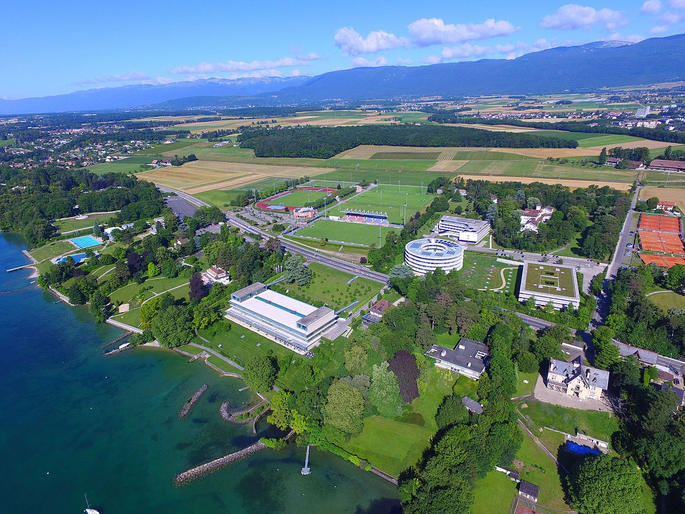
Just as the FA Cup is the senior trophy when compared to the less coveted EFL Cup in English football, so too is the Europa League the less-fancied alternative to the Champions League in the world of European club football. Developed out of the Inter-Cities Fairs Cup, which had been formed in 1955, the competition was known as the UEFA Cup before it was rebranded ahead of the 2009-2010 season.
The rebranding of the tournament wasn’t seen as the conclusion of the previous iteration of it, so all of the previous records and statistics remained in place and teams kept their previous wins of the competition in the history books. Just because it doesn’t garner the same respect from some quarters as the Champions League, it is still considered to be one of the major trophies that sides can win.
The Inter-Cities Fairs Cup: 1955 to 1971

The Inter-Cities Fairs Cup was set up, as the name suggests, to promote trade fairs between different international cities. It evolved out of the fact that friendly football matches would often take place between teams from cities that hosted such fairs, meaning that a more structured competition seemed almost inevitable. That competition was set up in 1955 and ran for sixteen years, at which point the organisation of the tournament was taken over by UEFA.
UEFA decided to rebrand the competition when they took control, but because they hadn’t been the organising body of the Inter-Cities Fairs Cup they chose to completely revamp it and, in essence, end the previous tournament and start a new one. As a result, wins of the Inter-Cities Fairs Cup are considered to be separate and distinct from victories in the UEFA Cup / Europa League. That being said, it is still considered to be a major honour by FIFA.
The UEFA Cup: 1971 to 2009
Part of the reason why UEFA took over the running of the Inter-Cities Fairs Cup is that it had become a hugely important competition in European football. At the start of its life eleven teams had been invited to take part, but this had increased to sixty-four. One of the key things that Europe’s governing body did was to abandon a rule that dictated only one team per city was allowed to play.
The rule had been particularly damaging for English clubs, given the English league’s strength when compared to other major European countries. In 1969-1970, for example, Everton, Chelsea, Tottenham Hotspur and West Ham United should have taken part in the Inter-Cities Fairs Cup but didn’t because Liverpool qualified, stopping Everton from playing, and Arsenal did so to remove the three other London clubs from the tournament.
Though the the Football League upheld the ‘one city, one club’ rule until pressured to change their stance by UEFA, it didn’t weaken English clubs in the competition. Indeed, the first outing of the UEFA Cup saw two English teams go head-to-head in Wolverhampton Wanderers and Tottenham Hotspur, with the London club emerging victorious. Liverpool, the dominant club in English football in the 1970s and 1980s, won the trophy the following year when they beat Borussia Mönchengladbach in the final. They would go on to win the trophy for a second time in 1976.
List of UEFA Cup Winners – 1972 to 2009
| Country | Club | Years Won |
|---|---|---|
| Belgium | Anderlecht | 1983 |
| England | Ipswich Town | 1981 |
| Liverpool | 1973, 1976, 2001 | |
| Tottenham Hotspur | 1972, 1984 | |
| Germany | Bayer Leverkusen | 1988 |
| Bayern Munich | 1996 | |
| Borussia Monchengladbach | 1975, 1979 | |
| Eintracht Frankfurt | 1980 | |
| Schalke 04 | 1997 | |
| Italy | Inter Milan | 1991, 1994, 1998 |
| Juventus | 1977, 1990, 1993 | |
| Napoli | 1989 | |
| Parma | 1995, 1999 | |
| Netherlands | Ajax | 1992 |
| Feynoord | 1974, 2002 | |
| PSV Eindhoven | 1978 | |
| Portugal | FC Porto | 2003 |
| Russia | CSKA Moscow | 2005 |
| Zenit Saint Petersburg | 2008 | |
| Spain | Real Madrid | 1985, 1986 |
| Sevilla | 2006, 2007 | |
| Valencia | 2004 | |
| Sweden | IFK Goteborg | 1982, 1987 |
| Turkey | Galatasary | 2000 |
| Ukraine | Shakhtar Donetsk | 2009 |
One of the most interesting things about the UEFA Cup’s formative years is the manner in which different teams and countries appear to dominate. Whilst England supplied three of the first five winners, for example, no team from Southern Europe lifted the trophy until Juventus achieved it in 1977.
In the 1980s the competition was won by IFK Götenborg and Real Madrid twice apiece, whilst no Italian side won it until Napoli did so in 1989. That was also the moment that kick-started a period of Italian dominance.
Only three times during the decade of the 1990s did the winning side not come from Serie A and even then two of them were from the same league in the Bundesliga. Ajax were the sole winners of the tournament across the ten years that were the only team to win it for their country during that time.
The turn of the millennium saw a new set of teams lift the trophy alongside some familiar faces. Galatasaray won it for the first time in their history in 2000, whilst Liverpool lifted the trophy for the third time when they beat Spanish side Deportivo Alavés in dramatic style the year after. Feyenoord won the title for the second time in 2002, whilst Porto, Valencia, CSKA Moscow and Sevilla all became first time winners in the years that followed. In fact, the only side that had already won the trophy when they lifted it between 2003 and 2009 was Sevilla when they defended their crown in 2007.
The Europa League Rebrand: 2009 to Present
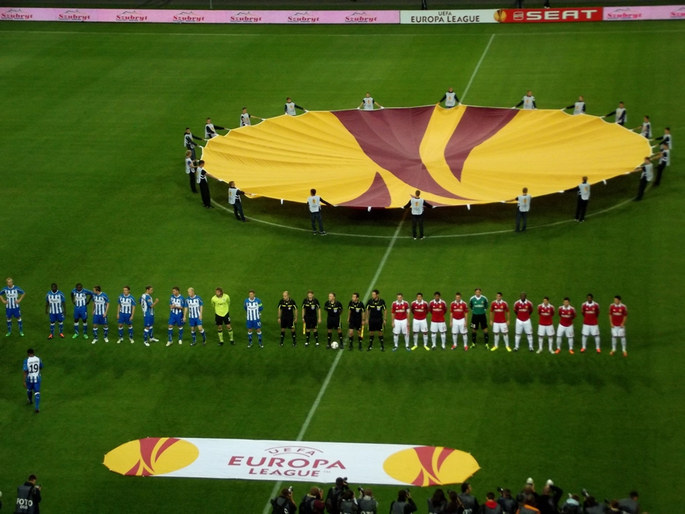
Despite the European Cup becoming the Champions League in 1992, the UEFA Cup continued with its old name until the start of the 2009-2010 season. That was the moment at which it was rebranded to become the Europa League, which was a decision taken in order to try to increase the tournament’s profile around Europe. Having introduced the idea of a group stage for the 2004-2005 season, it became more officially group-based when it relaunched with its new name and look.
On top of that, eight more teams were invited to play in the groups, which were made up of twelve groups of four. The top two teams in each group qualified for the next round, which saw a return of the knockout format that teams had played in during the competition’s history. It was a switch that played into the hands of Sevilla, the side that had won back-to-back titles in 2006 and 2007, when they achieved a similar feat by lifting the trophy on three successive occasions between 2014 and 2016. It made them the tournament’s most successful side, overtaking Liverpool, Juventus and Internazionale who had all won it three times and made one additional final.
Europa League Winners – 2010 to 2022
| Country | Club | Years Won |
|---|---|---|
| England | Chelsea | 2013, 2019 |
| Manchester United | 2017 | |
| Germany | Eintracht Frankfurt | 2022 |
| Portugal | FC Porto | 2011 |
| Spain | Atletico Madrid | 2010, 2012, 2018 |
| Sevilla | 2014, 2015, 2016, 2020 | |
| Villarreal | 2021 |
Current Format & Qualification
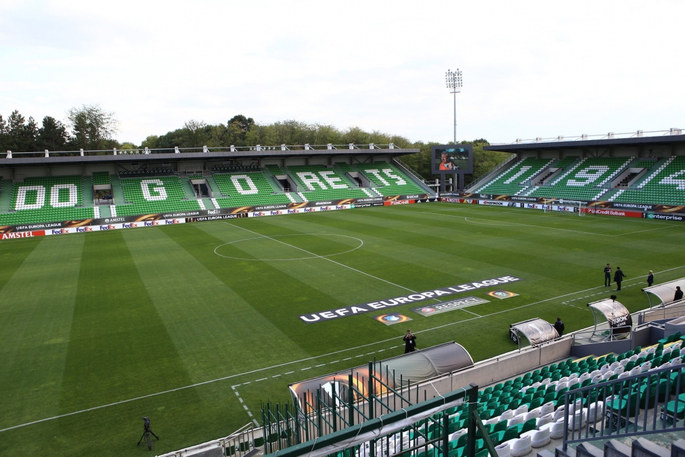
Qualification for the Europa League is actually surprisingly complicated, not least of all because teams join the competition at different stages. In essence it is based on UEFA coefficients, which result in stronger nations being offered more places. Typically speaking, the first fifty-one countries according to the coefficient are offered three places, with those positioned fifty second and and fifty third getting two and the fifty fourth best country receiving just one berth. In practice, some countries get more qualifying positions than others.
Each nation is then allowed to put forward its own qualification criteria, which is usually decided upon by league performance and the winning of domestic cups. If a team wins the right to play in more than one competition, say by finishing second in the Premier League for Champions League qualification and winning the FA Cup to get a place in the Europa League, they will be entered into the Champions League and their Europa League place will go to the next highest placed league team not already in a European competition instead.
Countries have a set number of places available for teams to enter straight into the group stage of the tournament, with the remaining teams needing to make it through a qualifying and play-off stage first. Once they’ve done that they will be split up into twelve groups with four teams in each. They’ll play each other home and away within their groups, with the top two teams qualifying for the knockout stage of the last thirty-two.
The more observant amongst you will have noticed that two teams from twelve groups adds up to twenty-four, so how does the knockout stage get underway with a round for the last thirty-two teams? You’ll remember from the start of this section that we said that qualification was complicated as teams make it into the tournament at different times. This is what we were referencing, with the sides that made it through the groups being joined by the teams that finished third in the Champions League group stage.
At this point the competition becomes a straight knockout tournament all the way to the final, with each round apart from the last one taking place over two legs. The final was also a two-legged affair until the 1997-1998 season.
The Trophy & The Anthem
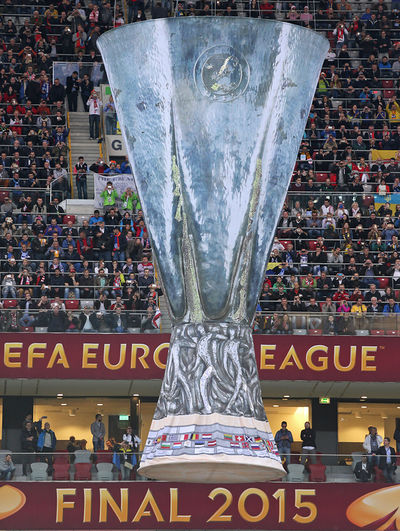
Winners of the Europa League are rewarded with a place in the following season’s Champions League as well as becoming finalists in the UEFA Super Cup, which is a one-off game between the winners of the two UEFA run European competitions. More importantly, though, teams also lift the Europa League trophy itself.
Known as the Coupe UEFA, the trophy is the same one that UEFA Cup winners lifted for more than three decades. Crafted and designed by Bertoni for the 1972 final, the trophy is silver and sits on top of a yellow marble plinth. It weighs fifteen kilograms and remains in the possession of UEFA at all times. Winners receive a replica, whilst a side that wins it three consecutive times or fives times in total receives a multiple-winner badge.
Believe it or not, there have been three different versions of the Europa League anthem. The first was composed by Yohann Zveig in 2009, whilst the second was the brainchild of Michael Kadelbach before the 2015-2016 campaign. The third version of the anthem was created by MassiveMusic ahead of the 2018-2019 season.
Prize Money
When it comes to prize money, teams receive different amounts depending on how far they make it into the competition. Those that only make it to the preliminary round, for example, receive €220,000. If a team makes to the group stage then they’ll receive a base fee of €2,920,000 and will get €570,000 for each group match victory achieved. Here’s a look at the prize money added to the initial winnings for the later rounds:
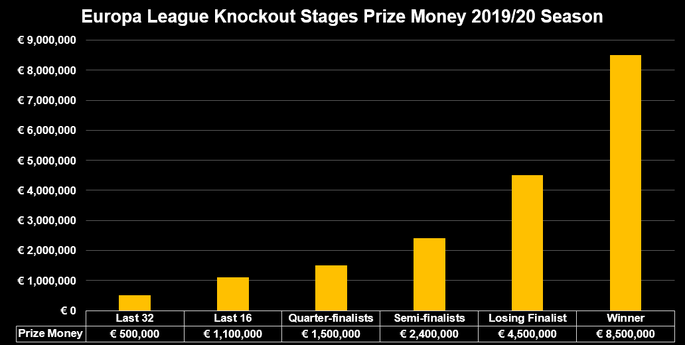
Interesting Facts
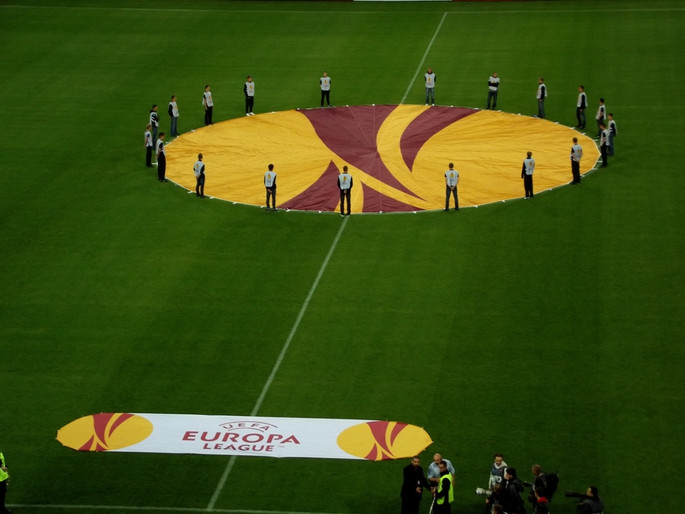
The UEFA Cup and rebranded Europa League is a competition with a rich history, complete with countless interesting fact and stories. When Liverpool beat Alavés in 2001, for example, they did so courtesy of the short-short-lived Golden Goal experiment. This said that a team would win the match if they scored a goal during extra-time, which the Reds did when Delfí Geli scored an own goal with four minutes of extra-time remaining.
Spain has sent more winners than any other nation with thirteen, six of which were Sevilla. England and Italy are next with nine, then Germany with seven winners. Belgium, Ukraine and Turkey have sent one winner apiece. Here’s a look at some other interesting facts:
- The competition’s all-time top scorer is Henrik Larsson, who netted forty times for three different clubs
- Four players – Aritz Aduriz, Darko Kovačević, Jupp Heynckes and Radamel Falcao – have been the competition’s top scorer more than once
- Darko Kovačević was top scorer for two different clubs in successive seasons, scoring eight times for Real Sociedad in 1998-1999 and then ten times for Juventus in 1999-2000
- Borussia Monchengladbach has provided more top scorers than any other club with four
- More German players have been top scorers than those from any other nation, with 13 players scoring 117 goals between them
- Sevilla is the most successful city with 6 wins, one ahead of Madrid which has supplied five winners
- As of the 2020/21 season, Internazionale have won more points than any other side by notching up 236 points across 191 games
- England and Germany have both provided 18 different participating clubs in the Europa League era, one more than England, with Italy coming next with 14 and Portugal, Spain and France with 12 each
- France supplied 13 of the teams during the UEFA Cup era, with Spain offering 12
- Internazionale have appeared in more semi-finals than any other side with 8 appearances at that stage
- Villarreal, Chelsea, Tottenham Hotspur, Borussia Mönchengladbach, IFK Göteborg (twice), Ajax, Galatasaray and Feyenoord have all won the trophy without losing a single match during the competition
- Sevilla have appeared in six finals and won them all
- Benfica and Marseille, meanwhile, have appeared in more finals without winning the trophy than any other team with three apiece
